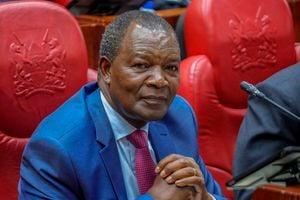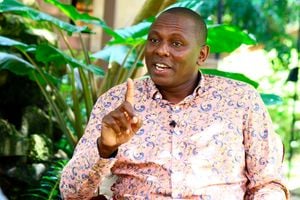
Senate Speaker Amason Kingi and his National Assembly colleague Moses Wetang’ula.
Parliament is seeking at least Sh3.6 billion in the next financial year for MPs’ post-retirement medical plan, an overhaul of the chamber system, makeover of its kitchen and live broadcasting of plenary and committee proceedings.
Lawmakers have presented Sh65.8 billion budget estimates for the 2024/25 fiscal year, which dwarfs the Sh38 billion sought by the Judiciary.
The proposed allocation also exceeds the Sh40.74 billion given to Parliament in the current financial year.
The document presented by the Parliamentary Service Commission (PSC) has Sh61.03 billion component in recurrent outlay and Sh4.79 billion for development spread across the four votes of the National Assembly and Senate.
Also Read: New Budget slashed by Sh267bn on revenue dip
The votes are the PSC that is chaired by the Speaker of the National Assembly (Sh3.06 billion), National Assembly itself (Sh32.49 billion), Parliamentary Joint Services (Sh8.63 billion) and Senate (Sh14.42 billion).
“The gross total resource requirement for the 2024/25 financial year, which I lay on the table of the National Assembly and request that it be considered and approved, is Sh65.8 billion,” says Speaker Moses Wetang’ula in the estimates.
The proposed budget includes Sh1 billion seed capital for MPs’ medical scheme after retirement, Sh900 million for the overhaul of the chamber system, Sh800 million for the procurement and replacement of the Hansard system and continuous training of MPs and parliamentary employees.
It also contains Sh165 million for sprucing up the kitchen and Sh700 million for live broadcasting of plenary and committee proceedings.
The estimates exceed the Sh43.6 billion ceiling contained in the Budget Policy Statement (BPS) that was approved by the National Assembly in March.
According to the PSC, the drivers of the estimates include the demand by Kenya Revenue Authority on Pay-As-You-Earn on Sh1.5 billion motor vehicle reimbursement.
“This continues to rise due to interest and penalties,” the document says.
There is also the additional Sh2.5 billion for MPs and staff mortgage, Sh2 billion for Senate oversight, Sh1.5 billion for House committees and the development of a Centre for Parliamentary Studies and Training.
Other key drivers are Sh1 billion for the completion of Bunge Tower and Sh1 billion for maintenance of the parliamentary square.
The PSC has budgeted Sh500 million for hosting the East Africa Legislative Assembly games, Sh300 million for critical House leadership committees, Sh200 million for facilitating the National Dialogue Committee and Sh50 million for replacing elevators at Continental Building.
The commission says the estimates have been cast on the assumption that the Sh43.6 billion ceiling will be adjusted upwards.
“The legislative sector has made significant progress towards realising the national goals and objectives,” the document reads.
“Adequate resources for the sector will enhance services and effectiveness in the oversight and representation functions.”
According to Mr Wetang’ula, the estimates have taken cognizance of the need to facilitate members achieve their constitutional mandate as well as promoting democracy.
President William Ruto hoped parliamentary budget to fall by Sh400 million in the 2024/25 fiscal year with the opening of Bunge Tower.
The expected reduction was pegged on the fact that the Sh400 million that Parliament spends to hire venues in hotels for committee meetings would be saved.
Also Read: MPs fault ‘Tower of endless billions’
The adoption of the BPS formed the basis for the publishing of the Division of Revenue Bill 2024, which allocates funds to the national and devolved governments.
Parliament transacts its business through committees.
The commission prepares annual expenditure and submits it to the National Assembly for approval.
The National Assembly determines the allocation of revenue between the two levels of government.
Senate protects the interests of counties through legislation, determining allocation of national revenue as well as impeachment of the president, deputy president, governors and their deputies among others.









